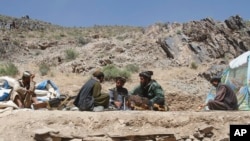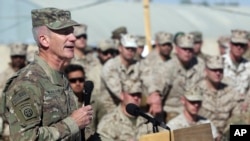The Taliban, in an “open letter” to the American people has called for dialogue to end the prolonged Afghan war, claiming increased U.S. military airstrikes have not "retaken even a single inch of land" from the insurgency.
Taliban spokesman Zabihullah Mujahid released copies of the 10-page document Wednesday in several languages, detailing insurgent gains and so-called failures of the “illegitimate” U.S.-led invasion, now in its 17th year.
The insurgent group has written the letter with the hope the American people, independent groups and “the peace loving Congressmen” will read it “prudently” to evaluate the future of their military mission in Afghanistan.
When asked about the letter Friday, South Carolina Republican Congressman Joe Wilson, a member of the House Committee on Foreign Affairs, told VOA (Urdu Service) the Taliban needs to change.
"The best way to have influence with Congress is for the Taliban to change their conduct. Mass murder, as has occurred in the last several weeks, of innocent civilians in Afghanistan, is not the way to give any indication of being accurate in their ability to truly negotiate for the benefit of the people of Afghanistan. The best way for the Taliban, really, is to change course, " he said.
The U.S. undertook the “felonious act” to eliminate the “single unified” Taliban and al-Qaida, but it “merely paved the way for anarchy” and emergence of multiple groups in the country, the letter alleged. It apparently was referring to, among others, the rise of Islamic State in the country.
Loyalists of the Middle East-based terrorist groups have lately increased attacks in parts of the country, particularly in the eastern and northern provinces.
The insurgent letter also cited recent U.N. surveys to note record levels of opium-poppy production in Afghanistan, saying it is fueling insecurity, though U.S. officials estimate 65 percent of Taliban funding comes from the illegal narcotics trade.
The Taliban reiterated U.S. and Coalition countries have lost thousands of their citizens and spent billions of dollars to establish a legitimate Afghan government, but their efforts have instead led to a politically divided and financially corrupt ruling system in the country.
“If you want peaceful dialogue with the Afghans specifically, and with the world generally, then make your president and the war-mongering congressmen and Pentagon officials understand this reality and compel them to adopt a rational policy towards Afghanistan,” the letter said.
The Taliban has released the letter at time when the United States has stepped up airstrikes in support of anti-insurgent ground and air operations by Afghan forces under President Donald Trump’s new war strategy to break the military stalemate with the Taliban and push insurgents to the negotiating table.
During a visit this week to eastern Afghanistan, General John Nicholson, who commands the U.S. and NATO’s Resolute Support mission in the country, said the intensified offensive is yielding results.
“The success of the Afghan operations around the country, supported by Resolute Support and U.S. forces, has caused the enemy high casualties everywhere. This has caused them to stop their attempts to seize provincial capitals, to stop trying to seize districts,” Nicholson said.
The American general asserted a recent wave of Taliban suicide bombings against Afghan civilians stemmed from insurgent battlefield setbacks and losses.
The Taliban’s letter, however, questioned those assertions.
“Only in past September — in accordance with Trump’s new strategy — American forces used all their new powers and carried out 751 airstrikes. You should ask your generals that despite using such force, have you retaken even a single inch of land from the Taliban, or have they become even more powerful.”
The insurgent group insisted the presence of American forces in Afghanistan and the “inexperienced policies of President Trump and his warmonger advisers” will mean more hostility for and beyond the region.
The Taliban has long wanted direct talks with Washington, saying they are the final authority to determine the fate of the war and dismissing Afghan rulers as "mere American puppets."
U.S. officials maintain any peace process involving insurgents has to be initiated under the leadership of the Kabul government and within the Afghan constitution, requiring the Taliban to renounce violence and ties with al-Qaida terrorists.
The Afghan government has not commented on the Taliban letter.
Afghan President Ashraf Ghani has been calling on insurgents to engage in a peace process to end the war. But in the aftermath of deadly bombings in Kabul late last month, Ghani vowed not to engage in talks with those who publicly took credit for plotting the violence.
Afghan ambassador to Washington, Hamdullah Mohib, has claimed the Taliban’s open letter is an admission of defeat and a “face saving” attempt to seek a “truce.”
The Afghan government has always had an “open arms approach” to peace talks and it will be happy to “reintegrate all those Taliban that repent their actions and seek forgiveness from the Afghan people for their atrocities,” wrote Mohib on his official Twitter account.
The attacks, including a suicide car bombing, targeted the Intercontinental hotel in the Afghan capital and the city’s old interior ministry building, killing around 140 people, mostly civilians. The hotel attack also left at least four Americans dead.
Taliban spokesman Mujahid claimed responsibility for both the attacks, saying they were aimed at Afghan and U.S. security personnel.
The violence has since fueled anger against the Taliban in Kabul and prompted Trump to close doors for peace talks with the insurgents.





